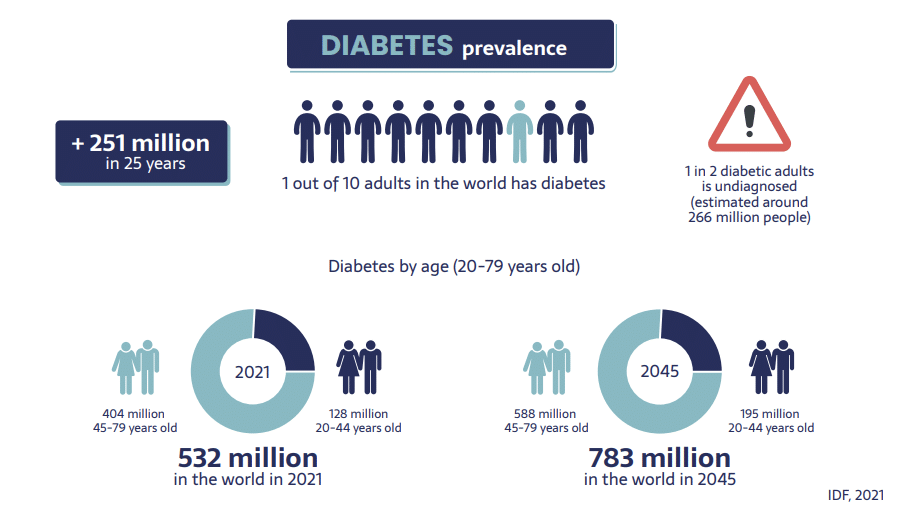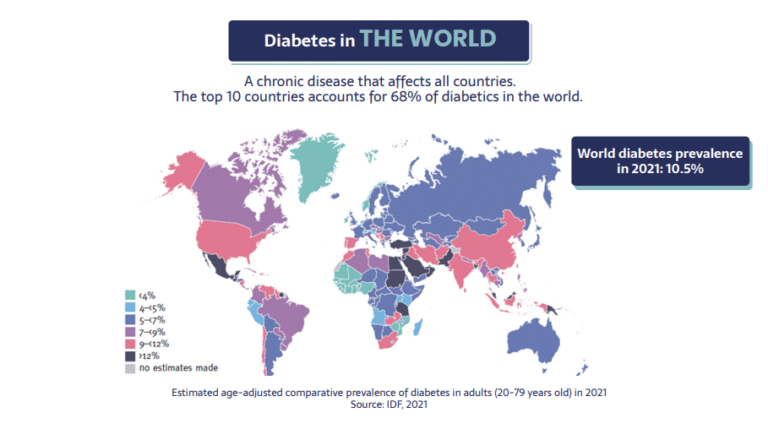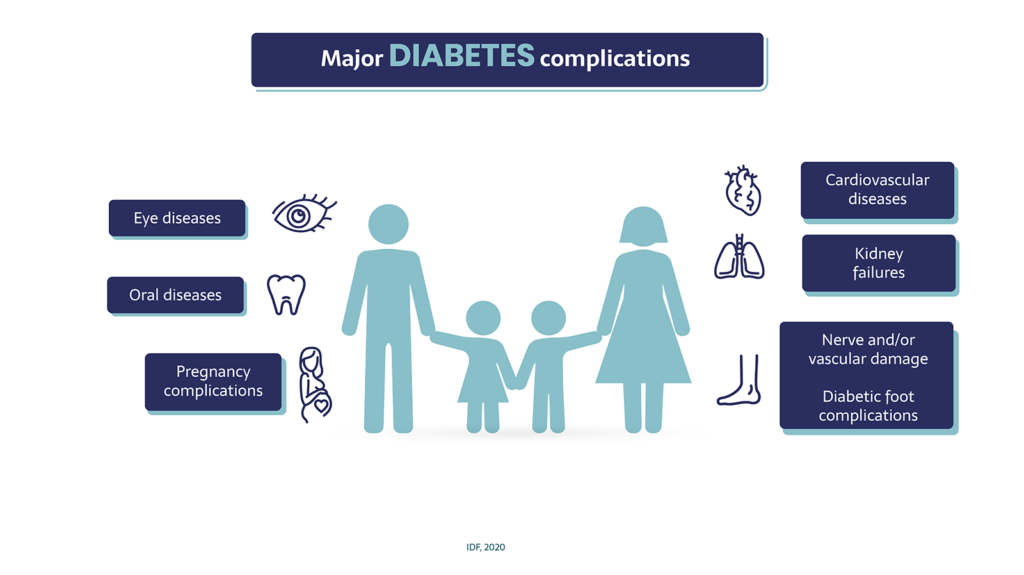
Who is affected and what are the health risks?

Diabetes affects more than 532 million people worldwide or 10.5% of the world’s adult population.
In 2015, more than five million people died from it, which is one death every six seconds.
The disease is among the top five causes of death.
In France alone, the number of diabetics has risen to more than four million people.
If we look ahead, the so-called « disease of the century » could affect more than 783 million people by 2045.
* www.idf.org : Diabetes facts & figures
* ceed-diabete.org : Les chiffres du diabète
« 43% of diabetics will be over 65 in 2045 »
– www.idf.org : Diabetes facts & figures
Risk factors for diabetes
Whether it be type 1 or type 2, diabetes affects every country in the world. The disease canbe explained by several risk factors. The two main ones are genetics and sedentary lifestyles. There are also other reasons for the seemingly endless march of diabetes through our societies.

Genetic predisposition
The hereditary factor is particularly important in the transmission of type 2 diabetes. People who have a close relative (mother, father, brother or sister) with type 2 diabetes have a 40% greater chance of contracting it. If both parents have diabetes, the risk grows to 70%.
In addition, some populations are genetically more susceptible to type 2 diabetes.
- Africans
- Latin Americans
- Asians
- Indigenous populations in North America
Sedentary lifestyles, junk food and smoking
A real scourge of our contemporary society, sedentary lifestyles can be defined asa lack of physical activity in addition to the boom in office work. It is generally paired with diets that lack variety and are too high in sugars and fats. This factor has dramatically increased the number of cases of type 2 diabetes. Smoking and stress can also be included in this category.
Overweight and obesity
According to the World Health Organization (WHO), overweight and obesity affect more than a quarter of the world’s adult population. They result from poor diet, lack of physical activity and sometimes a genetic predisposition. It should be remembered that obesity is a disease. More than 80% of type 2 diabetics live with excess weight. The mass of abdominal fat particularly influences the onset of diabetes.
A person is at increased risk of developing diabetes if:
- Their body mass index (BMI) exceeds 28
- The ratio of ‘good cholesterol’ (HDL cholesterol) does not reach 0.35 g/L
- The ratio of triglycerides (bad fats) exceeds 2 g/L
Unequal access to healthcare
Type 2 diabetes does not differentiate between rich and poor populations. However, unequal accessto healthcare treatment brings complications. Efforts to detect prediabetes hardly exist in some countries due to the lack of resources, despite the factthat 80% of these cases will turn into type 2 diabetes.
High blood pressure
High blood pressure carries a 50% increased risk of contracting type 2 diabetes. The reverse is also true.
Gestational diabetes
For women, two events increase the risk of suffering from diabetes:
- Gestational diabetes, which sometimes arises during pregnancy
- The birth of a babyweighing more than 4 kg

Complications linked to type 2 diabetes
The disease, which inducesoverly high blood sugar levels, causes serious complications if it is not treated in time:
- Cardiovascular events, which cause 80% of the deaths from type 2 diabetes
- Cerebrovascular accidents (strokes)
- Retinopathy, which sometimes leads to blindness
- Kidney failure, leading to lifelong dialysis
- Nerve damage in the lower limbs, which can lead to amputations

Continue reading :
- What is diabetes?
- Diabetes summarised in three diagrams
- How is diabetes diagnosed?
- What are the symptoms of type 2 diabetes?
- What is the difference between diabetes and prediabetes?
- Type 2 diabetes: the role of food
- The role of physical activity in combatting diabetes
- Managing stress to avoid type 2 diabetes
Our latest publications
Want to learn more about topics related to blood sugar management?
Here are our most recent blog posts!


Contact information
51 Avenue F. Lobbedez
CS 60946
62033 Arras Cedex
France
Tel : +33 (0)3 21 23 80 00
Fax : +33 (0)3 21 23 80 01




